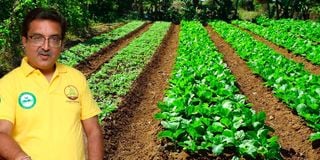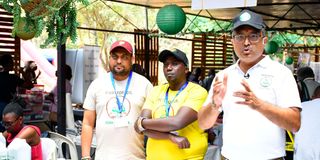Premium
Kumar Sheth, the financial manager who ventured into production of organic farm inputs

Food for Soil Africa founder Kumar Sheth.
For more than two and a half decades, Kumar Sheth worked his way up the corporate ladder to reach the highest level of financial management in a company. Having started out as an accountant in the 90s, he advanced to become a financial advisor for businesses looking to list on the Nairobi Stock Exchange, before being promoted to the position of group chief financial officer for the company he worked.
But in the year 2021, in a move that surprised many, he decided to leave all that behind for a career in agriculture.
"It all started during a discussion with a client who needed help in selling some of his farmland. As we were having our discussions, he mentioned something about the importance of safe food, which really picked my attention," noted Kumar in an interview with Powering SMEs.
The farmer expressed his concerns over using synthetic farm inputs, which were not only hazardous to crops, but which also prevented him from participating in the export market, especially in Europe, which intensely scrutinised end products for inorganic inputs.
The farmer wanted to start using organic inputs, but just didn't know where to source the inputs that would grant him the same yield as the one he got while using the inorganic inputs.
Holistic solution
For the farmer, getting a singular entity that would offer a holistic solution to his predicament was also a challenge. He would have to go to different entities to get these solutions and this was cumbersome.
“In essence, our encounters illuminated the fragmented nature of available solutions within the agricultural landscape. No single company emerged as a comprehensive problem solver, leaving a void in the form of a holistic approach that could address the multifaceted issues confronting our farmers,” noted Kumar.

Food for Soil Africa founder Kumar Sheth (left) after receiving a certification for production of organic inputs from Kilimohai.
He sought to fill this void. Using his savings, as well as some money he received from friends and family, he launched Food for Soil Africa Ltd in 2021. In essence, the firm would provide farmers with an integrated solution to some of the challenges they grapple with, including access to organic inputs.
He began conducting research on how to produce the inputs, travelling to countries such as India to benchmark and understand the formulas that were needed. He would also traverse the length and breadth of the country, visiting various farms in Kiambu, Limuru, Embu, Nyeri, Kisumu, Kisii, Loitoktok, Emali, Karatina Machakos, Kitui and Thika to understand what the farmers in these regions needed.
“I visited over 800 different small scale farms, exploring all the intricacies of farming. This journey provided me with a firsthand understanding of the challenges faced by farmers at the grassroots level,” noted Kumar.
A friend provided him with a go-down in Westlands, Nairobi, which he would use as the firm's workspace. He crafted seven organic inputs including a seed inoculant, soil cleanser, soil conditioner, manure cure, bio insecticide, fruiting and flowering biostimulant, and an anti-bacterial, fungal and viral product, which he registered with the Kenya Organic Agriculture Network (KOAN).
Kumar had spent most of his working life in an office set-up, therefore even though he had made some farm visits, he needed someone who had interacted with the farmers more to assist in reaching out to them.
“I onboarded an agronomist known as Chris, who became very instrumental in offering assistance during our farm visits,” noted Kumar.
Water scarcity
Together, they put up a distribution network and began working on popularising the product. Before selling any inputs to farmers, they would first pay the farmer a visit in their farm, to assess what the main issue was, whether that be soil quality, water scarcity, deficiencies in plant nutrition, pest invasions, or climate change, so as to prescribe a solution that would be effective.
“The growing demand for chemical-free produce presents an opportunity, yet the challenge lies in connecting consumers who seek such products with farmers who produce them. We would also act as a bridge, ensuring that farmers can capitalise on the rising demand for healthier, environmentally conscious products,” noted Kumar.
In time, word of their products and services began to spread, as farmers spoke amongst themselves. It has now been two years since they started operating, and Kumar says that they have been able to assist several farmers across various agricultural domains such as coffee, tea, herbs, horticulture and fruits, in growing their production significantly.





